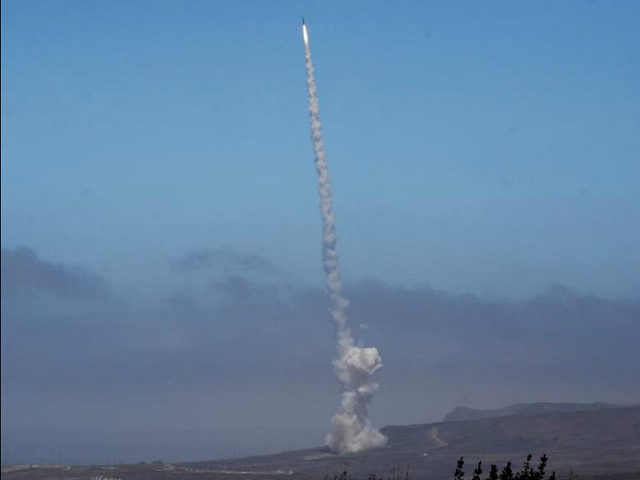At the Conference on Disarmament in Geneva, Switzerland, this week, a Russian official claimed that American anti-missile systems are increasing the risk of nuclear war.
“The presence of American ABM sites in Europe and ABM-capable ships in the seas and oceans close to Russia’s territory creates a powerful clandestine potential for delivering a surprise nuclear missile strike against Russia,” claimed General Viktor Poznikhir, deputy head of operations for the Russian general staff.
“The presence of the global ABM system lowers the threshold for the use of nuclear weapons, because it gives the U.S. the illusion of impunity for using strategic offensive weapons from under the protection of the ABM ‘umbrella,’” Poznikhir elaborated. “The ABM shield is a symbol of the build-up of rocket forces in the world and a trigger for a new arms race.”
Russian state outlet RT.com reports that Poznikhir dismissed the argument that anti-ballistic missile shields cannot intercept all of the missiles that could be fired by an adversary like Russia, so they do not offer the U.S. and its allies an impregnable shield against the consequences of aggressive action. His response to this argument evidently consisted of speculating that American technology will keep improving until ABM protection is nearly infallible. We can only hope his prediction is correct.
This is hardly a new argument from Russia, and China says essentially the same thing when it complains about systems like the Terminal High Altitude Area Defense (THAAD) launchers America is currently deploying in South Korea. Poznihkir’s warning about increased risk of nuclear war is a more hyperbolic variation on the usual complaint that America is attempting to box Russia and China in by surrounding them with anti-missile and anti-aircraft defenses.
China often complains that the sensory capabilities of THAAD are more upsetting than its ability to shoot down missiles; they say the U.S. is employing the pretext of North Korean nuclear aggression to set up a network of powerful radars that can spy on Chinese interests.
Contrary to Poznikhir’s accusations, no one in the U.S. military has any “illusion of impunity” about being able to attack anyone they please from behind impenetrable ABM systems. He also sounds ridiculous when he tries to pass off the increasingly deranged and chillingly capable North Korean menace as a mere “pretext” for some sinister American agenda. He ought to try swinging by Tokyo and trying that argument on the Japanese. Depending on how the election to replace ousted President Park Geun-hye goes in South Korea, Tokyo might even be more worried about North Korean missiles than Seoul is.
One purely political reason Russia and China constantly complain about U.S. anti-missile systems is that they do not want to admit how dangerous some of their client states really are. Conceding the scale and urgency of the threat posed by Pyongyang would require Pyongyang’s patrons to admit they’ve been feeding and grooming a feral hound in their backyards.
Poznikhir complains that American ABM technology is a “symbol for the build-up of rocket forces in the world,” but the reality of that buildup can be seen in Iran’s hefty missile purchases from Russia. If the Russians are truly concerned about missile proliferation, maybe they should stop selling missiles.
The National Interest observes that Russian missile mania is one of the main reasons THAAD exists:
In the late 1980s, the U.S. Army had a requirement for a system to shield ground troops from the threat of ballistic missiles. The Soviet Union integrated ballistic missiles into its force structure down to the division level, with a battalion of SS-21 “Scarab” short-range missile launchers integrated into every motor rifle and tank division stationed in eastern Europe. The SS-21 had a range of seventy-five miles. Further up the chain, the Soviets fielded the SS-23 “Spider,” the replacement for the venerable Scud missile, with a range of 310 miles. Finally, the SS-20 “Saber” intermediate-range missile could be expected to strike tactical targets throughout Europe at ranges of up to 3,200 miles.
The Army’s new medium-range air-defense missile, the Patriot, was not designed to shoot down incoming missile warheads, a very different task from the Patriot’s mission of downing low-altitude strike aircraft. The decision was made to develop a separate system, and in 1987 the system that would become THAAD was born.
THAAD was born just in time to handle the missile threat from those who bought or copied those ubiquitous Russian missiles, such as Saddam Hussein in Iraq. It takes a great deal for Russia to complain about the U.S. proliferating a system that was designed to counter Russian missile proliferation. Also, unlike Russia’s bumper crop of SCUD missiles, America has fairly tight control over its ABM systems, which often require active American participation to maintain and operate.
Iran’s defense strategy is heavily predicated on its ability to shower its neighbors with missiles in retaliation for an attack, including potential strikes from Western powers. That is the type of calculation that truly changes when advanced anti-ballistic missile technology is introduced as a variable. Russia and China are worried about the ability of their client states to plausibly threaten their neighbors.
Russian and Chinese rhetoric appears to be having little effect on the Pentagon, which asked for $151 million to finance 12 more THAAD interceptors in its 2017 budget.
“There is no other nation that needs to be concerned about THAAD other than North Korea if they’re engaged in something that’s offensive,” Secretary of Defense James Mattis said in February. Russia and China could do a great deal to make these ABM systems less necessary, but they see more geopolitical profit harvested with less effort – and less reduction to their financial profits – in complaining about American efforts to contain the rogue regimes they have indulged.

COMMENTS
Please let us know if you're having issues with commenting.